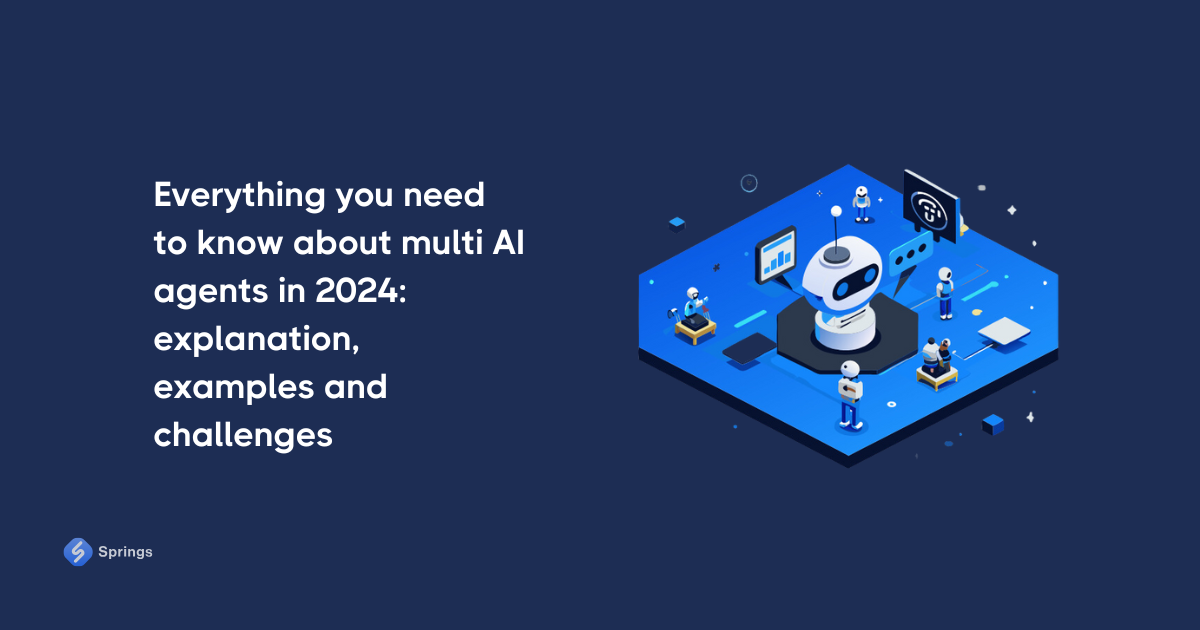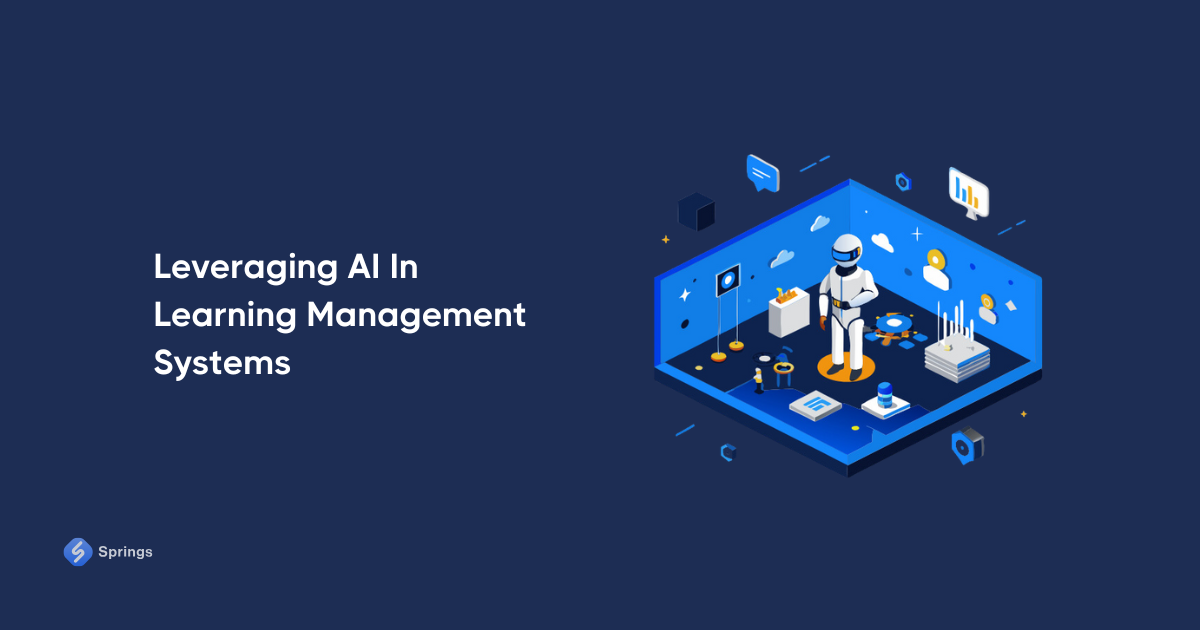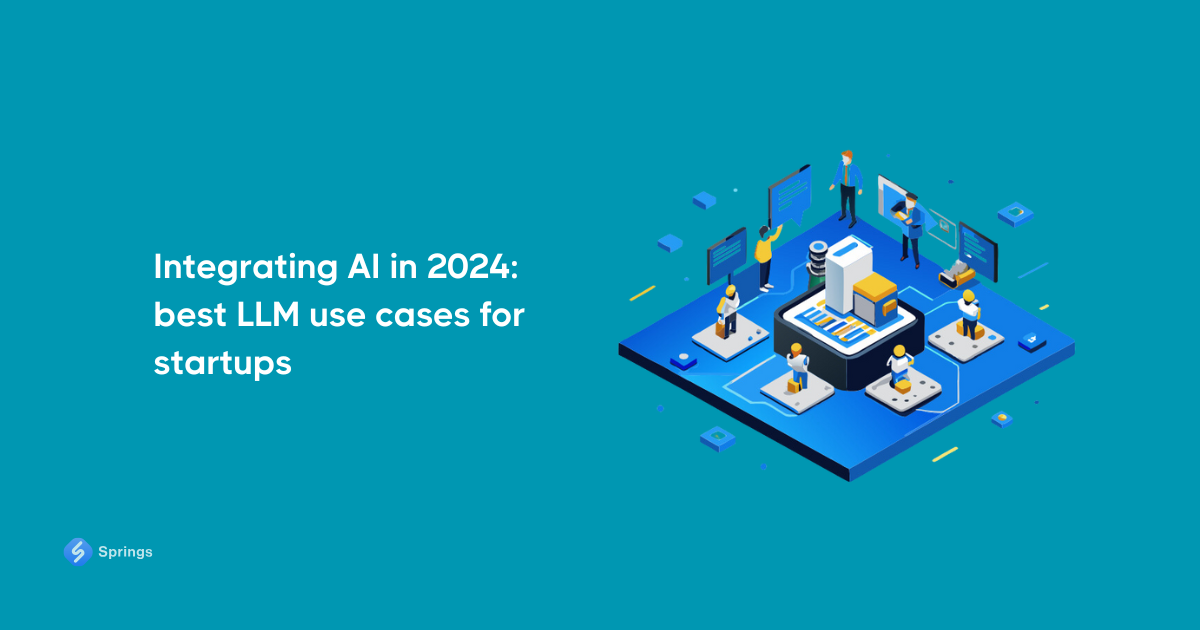Today everything goes digital, so the AI and eLearning world are changing pretty fast. One crucial change is the use of artificial intelligence in eLearning. Many researches show that the e-learning market could hit $848.12 billion by 2030, and the AI market in education might surpass USD 30 billion by 2032. Exciting times ahead!
Business owners in education need to find a way to how AI is shaking up eLearning to stay competitive and give learners or employees top-notch experiences. This can turn to developing AI software for eLearning, whether it's an AI-powered LMS or AI-tool integrated into existing management system.
In this article, we'll take a look at how AI is exactly transforming eLearning, what benefits it provides to businesses, and how to integrate AI to stay in the saddle.
Market Overview and Trends
The AI in the eLearning market is spreading up, bringing a wave of cool features to the learning stage. DDIDevelopment says, that this market is set to grow at an impressive CAGR of over 40% from 2021 to 2027. Here's what's the impact of this growth:
- Personalization and Adaptive Learning. AI in learning gives students a chance to personalize their process as they may choose the level of load. They also get ongoing feedback which helps to improve that experience, basically.
- Engagement and Interactivity. the presence of quizzes, internal fun tests, etc., makes it possible to diversify the educational process and make it more attractive in general. This is all achieved through AI chatbots and other tools.
- Data-Driven Insights. If you'd like to get info about a student's success and performance, AI will help with that immediately and doesn't even matter how much data you'll need to analyze. This will help tutors to find improvement areas for students and focus on certain points.
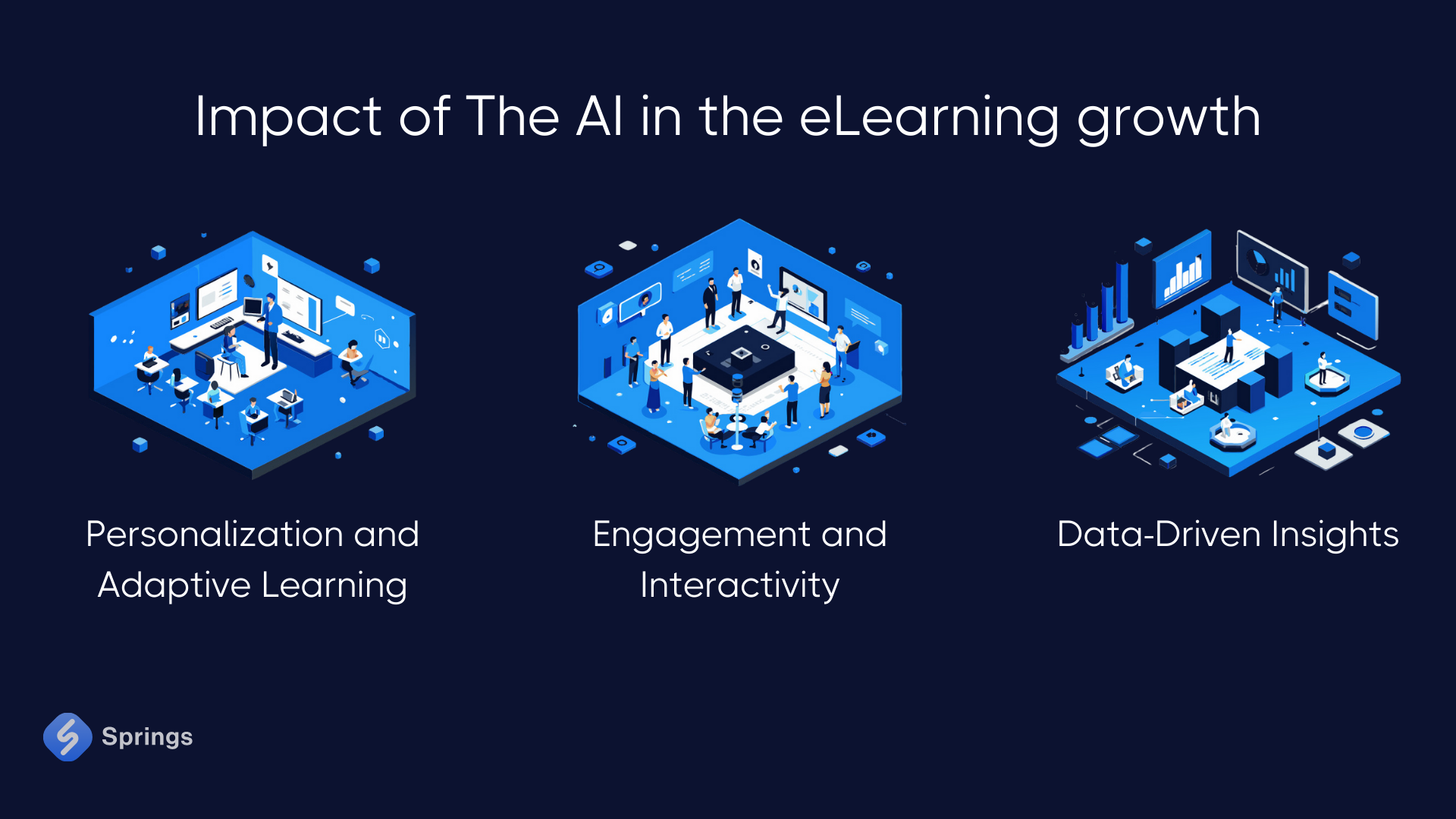
Key Market Players
There are plenty of companies that have mastered e-learning AI. Notable players include Coursera, Udacity, and Edmodo, all of which are leveraging elearning AI. These platforms use AI for various purposes, such as personalizing learning experiences, automating administrative tasks, and providing analytics and insights.
Challenges and Future Prospects
Despite the promising growth, the AI eLearning market faces challenges such as data privacy concerns, the need for significant investment in AI infrastructure, and the potential for bias in AI algorithms. However, ongoing advancements in AI technology and increasing acceptance of digital learning solutions are expected to overcome these challenges.
In the future, the use of AI in eLearning is poised to play an even more significant role in eLearning, with potential developments including more sophisticated adaptive learning systems, immersive virtual reality, and augmented reality experiences, and greater integration of conversational AI across all aspects of education.
Reference to Industry Insights
In our previous articles, we highlighted that the EdTech market in 2024 is characterized by rapid technological advancements and a growing emphasis on personalized learning experiences. The integration of AI in eLearning is a key driver of this transformation, aligning with broader trends in the EdTech industry.
AI has significantly transformed the eLearning industry:
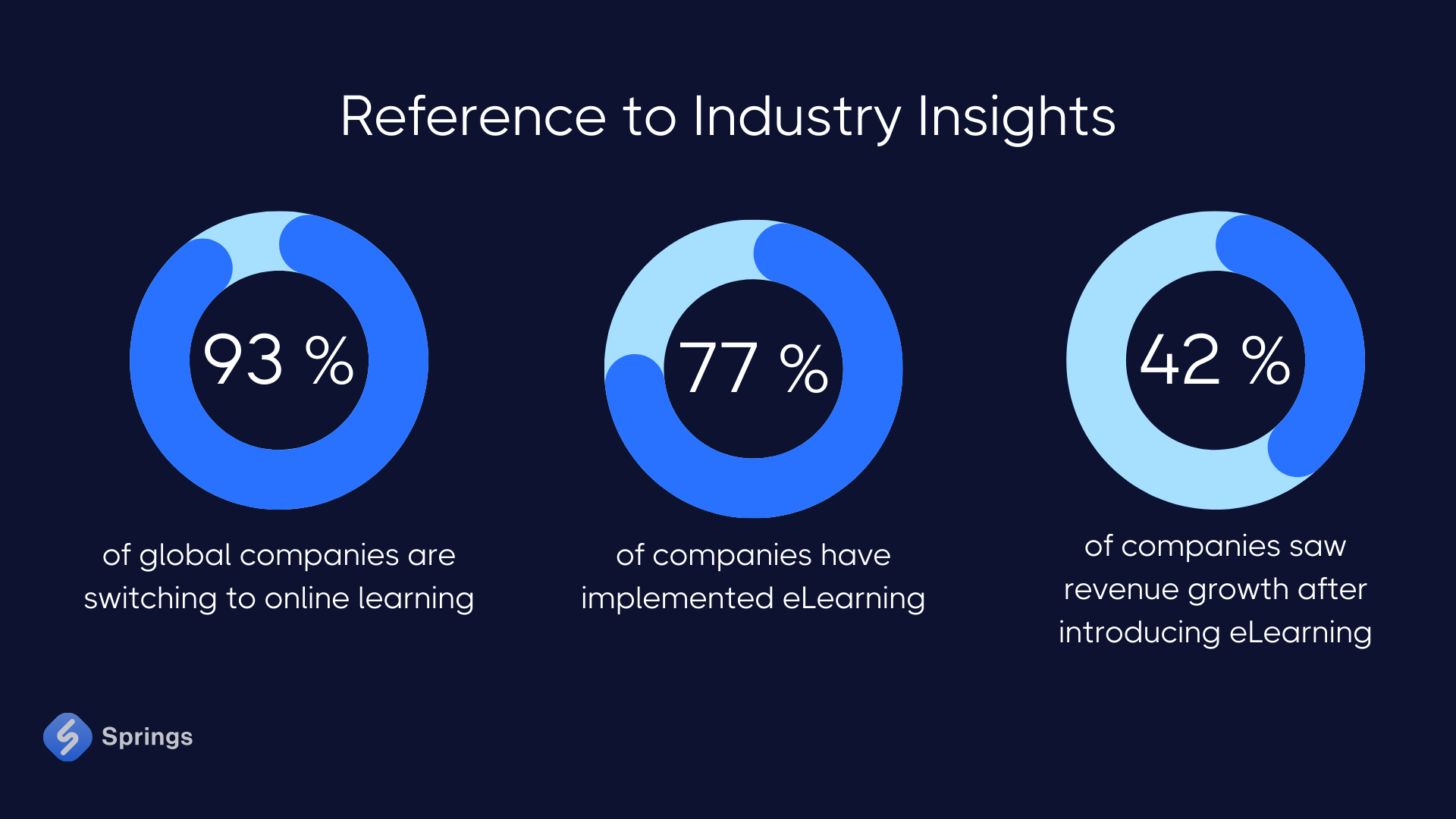
The AI in Education market is expected to reach $17.8 billion by 2027, growing from $4 billion in 2022. Proper implementation with a focus on inclusivity and quality can benefit students, teachers, and organizations. Springs specializes in AI-powered eLearning solutions, ensuring effective and engaging educational experiences tailored to your needs.
Visual Representation
The following table provides a visual representation of key trends in the AI in eLearning market based on data from DDI Development:
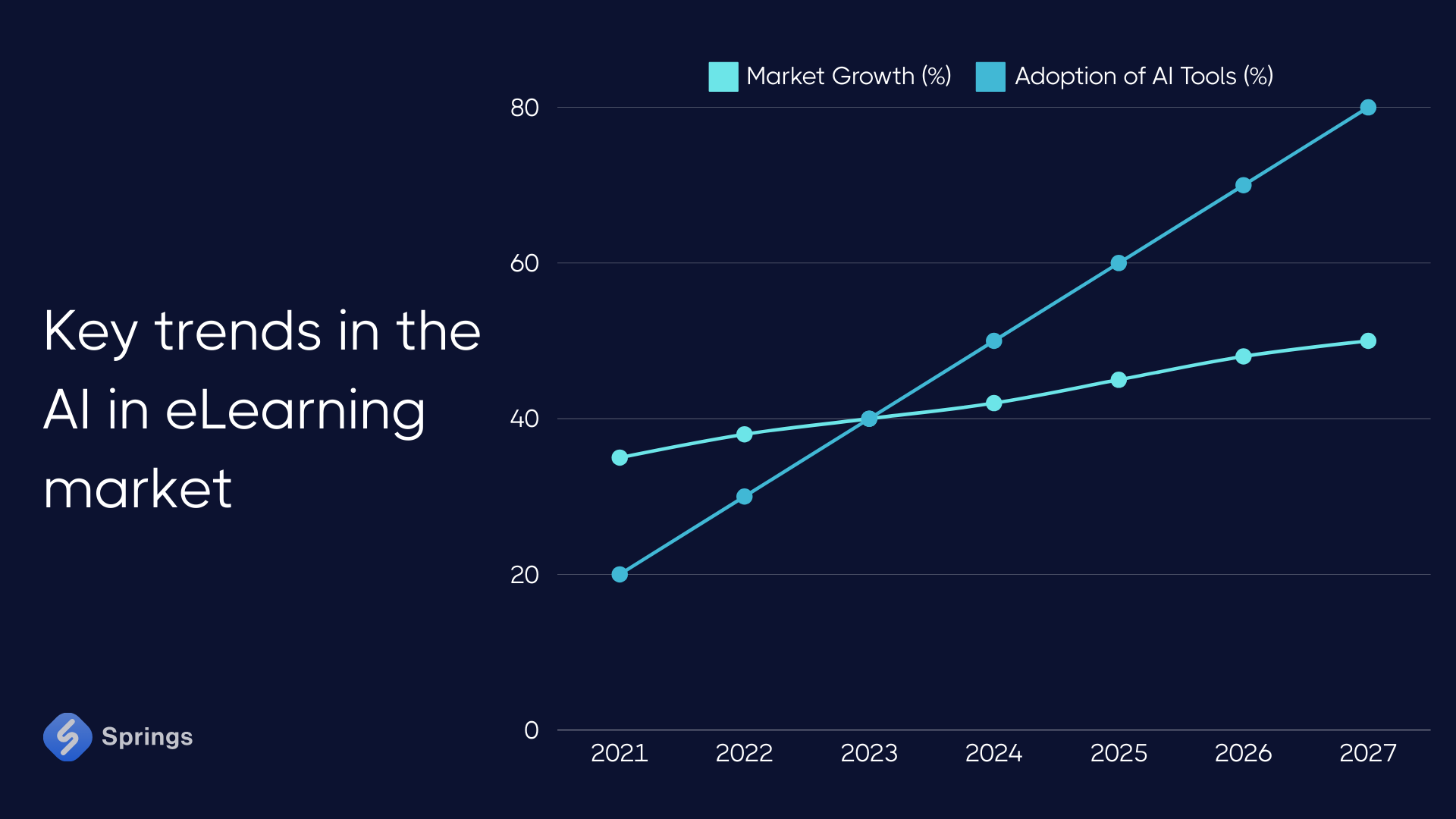
These figures illustrate the robust growth trajectory of the AI in eLearning market, the increasing adoption of AI tools, and the diverse applications of AI in educational settings.
AI in eLearning: Most Common Use Cases
Large Language Models like ChatGPT and Gemini have opened up new possibilities for eLearning platforms. Here are some popular and promising ways AI can transform online learning:
Intelligent Tutoring
There is a simulation system that reproduces human behavior in the learning process and provides feedback that is person-touched for a certain student. Intelligent Tutoring Systems use machine learning and natural language processing which analyze students' performance for improvement. There are a few options to interact with Intelligent Tutoring Systems: conversation or other media.
Automated Grader
If we need to optimize the valuable time of tutors, here we go with AI/ML development which helps to automate the evaluation process. It can be done with different options like assessment, questionnaire, and so on. LMS companies try hard to train the models to define improvement areas or mistakes with fantastic accuracy, so the tutors can be focused on unique and individual approaches by providing feedback.
Chatbots and Assistants
When students need ongoing feedback anywhere they are and whenever they study the chatbots can handle it. Tech support, providing education content, answering questions or so - this is easy work for chatbots or assistants. For sure, these chatbots automatically define what a student is currently doing and should provide proper info accordingly.
Adaptive Learning
Based on analytics of students' performance adaptive learning uses AI for personalizing and adjusting educational content. So, the level of learning could be set up based on performance. A perfect way to optimize learning paths in dynamic for higher efficiency.
Predictive Analytics
One more great feature that helps to analyze the student's studying behavior and foresee the potential performance. Predictive Analytics could be a helpful feature for choosing who can be the best student, or who needs to make better and optimize the structure of the course.
AI For eLearning: Real Examples
AI-powered eLearning tools have been already integrated into worldwide enterprises and huge corporations. Let’s have a look at the samples.
McDonald’s
McDonald's has integrated AI into its training programs with the launch of Archways to Opportunity, an AI-powered voice assistant. This tool analyzes employee performance to pinpoint strengths and areas for improvement. By doing so, it provides personalized training modules that cater specifically to each employee's needs. This system not only helps in enhancing skills but also in maintaining a high standard of service and operational efficiency across McDonald's outlets worldwide.
H&R Block
H&R Block employs an AI-based chatbot named Block Advisors to support and train its workforce. Utilizing natural language processing, the chatbot can interpret and respond to employee inquiries regarding tax preparation. This real-time assistance ensures that employees can access accurate and up-to-date information quickly, enhancing their ability to serve clients effectively. The AI-driven support helps streamline the training process and ensures consistency in the quality of service provided.
Hilton Hotels
Hilton Hotels has developed Hilton University, an AI-based learning platform designed to provide continuous education to its employees. The platform allows staff to access training materials and educational resources anytime, anywhere. This flexibility supports the diverse needs of Hilton's global workforce, ensuring that employees can pursue professional development opportunities without disrupting their work schedules. The AI system adapts the learning content to the individual’s progress, ensuring efficient and effective learning.
Ford
Ford has introduced an AI-based training platform known as FordPass, specifically aimed at enhancing the skills of its service technicians. The platform uses AI to interpret data from vehicle diagnostics, helping technicians to better understand and resolve issues. This targeted training improves the accuracy and speed of repairs, leading to higher customer satisfaction. By leveraging AI, Ford ensures that its technicians are well-equipped to handle the complexities of modern automotive technology.
Duolingo
Duolingo utilizes AI to create a highly personalized language learning experience. The platform adapts to the user's learning style, strengths, and weaknesses, offering customized lessons that optimize the learning process. Duolingo's AI capabilities include natural language processing to simulate real-life conversations through chatbots, providing users with practical language practice. This interactive approach helps learners build confidence and proficiency in new languages more effectively.
Thinkster
Thinkster combines AI with human tutoring to provide personalized math education for K–8 students. The AI component analyzes each student’s performance, adjusting the difficulty and type of questions based on their progress. This personalized approach helps keep students engaged and challenged at an appropriate level. Additionally, real tutors review the AI’s feedback and provide targeted support, creating a blended learning environment that maximizes student outcomes.
Querium
Querium’s virtual tutoring system focuses on STEM education, using AI to monitor and analyze the steps students take when solving problems. The AI provides immediate feedback, highlighting errors and guiding students toward the correct methods. This instant feedback helps prevent the reinforcement of incorrect techniques and reduces the burden on teachers by automating routine assessments. The system ensures that students receive consistent and accurate guidance, enhancing their learning experience.
Alta by Knewton
Alta by Knewton offers an adaptive learning platform that identifies knowledge gaps and provides tailored content to fill those gaps. This AI-driven approach ensures that learners receive the most relevant and effective study materials, improving their understanding and retention of information. Alta’s system continuously updates and refines the learning content based on the learner’s progress, making it a powerful tool for ongoing education and professional development. This adaptability makes it particularly useful for companies aiming to keep their training programs current and effective.
Challenges of adopting AI in e-Learning
The integration of generative AI into educational settings presents numerous challenges alongside its potential benefits. While AI tools can enhance learning experiences, their misuse or overreliance may impede critical thinking and creativity. A primary concern is that students might use AI to complete assignments without engaging deeply with the material, thus hindering their cognitive development.
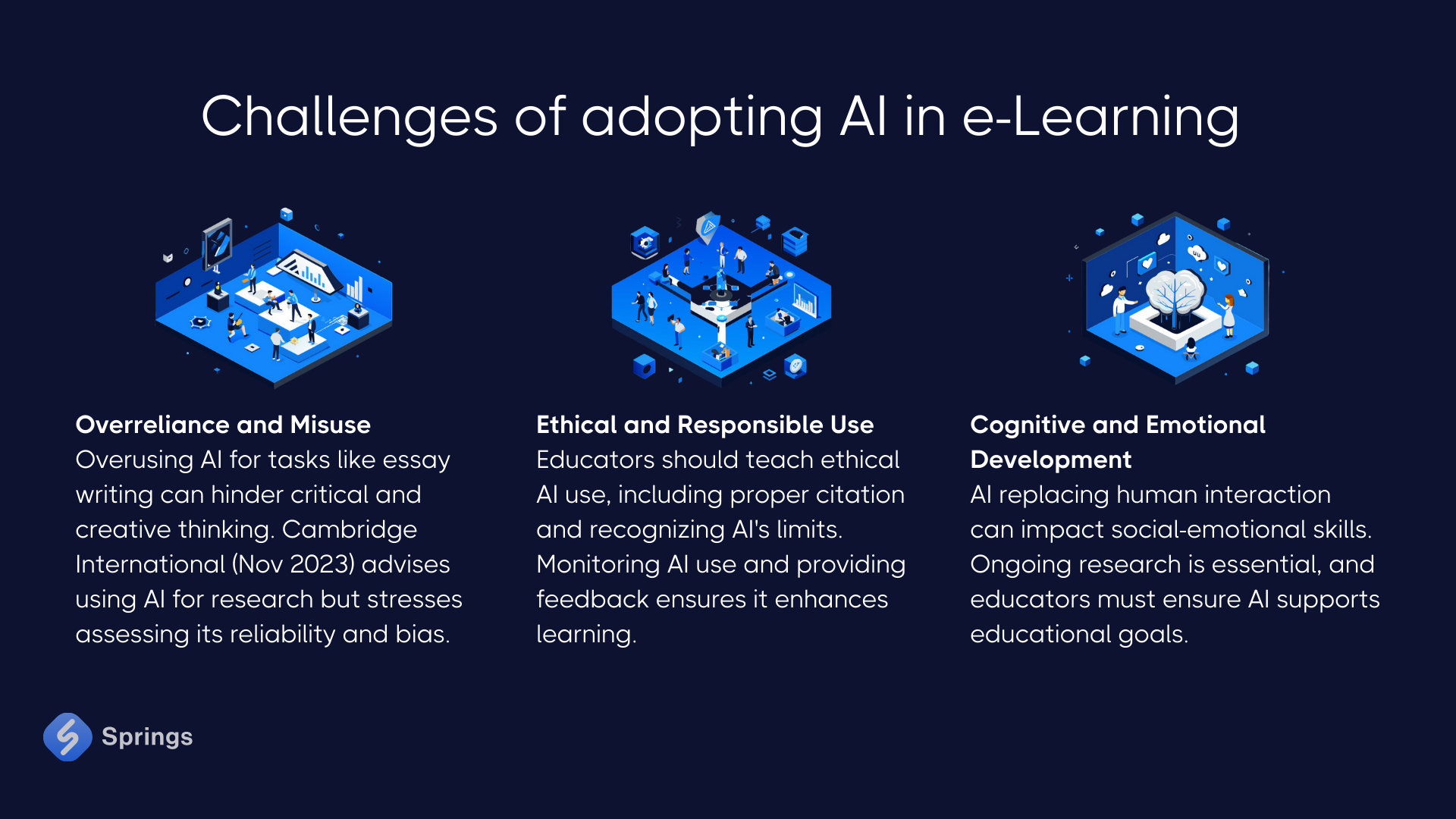
Overreliance and Misuse
Overdependence on AI, such as generating entire essays, can lead to a decline in students' abilities to think critically, and creatively, and synthesize new knowledge. Although AI can help focus on higher-level cognitive tasks, this benefit depends on the learner's genuine interest and intent to engage meaningfully with the subject matter. Cambridge International's guidelines on AI usage, published in November 2023, support AI for tasks like initial research but stress the importance of acknowledging and critically assessing AI-generated content for reliability and bias.
Ethical and Responsible Use
Educators must guide students in using AI ethically and responsibly. This includes proper citation of AI-generated material and understanding its limitations and potential biases. Teachers should be equipped to monitor AI interactions and provide constructive feedback to ensure AI enhances rather than detracts from learning.
Impact on Cognitive and Emotional Development
The potential for AI to replace human interaction in education raises concerns about social-emotional skill development, crucial for holistic growth. Ongoing research into AI's long-term effects on intellectual and emotional development is necessary. Educators must remain vigilant and responsive to these challenges, ensuring AI is a beneficial tool rather than a hindrance to educational goals.
In summary, while generative AI offers significant advantages in education, its integration requires careful management to avoid negative impacts on student learning and development.
Final Words
The future of AI eLearning is brighter than ever with the integration of AI, which places it at the forefront of educational innovation. AI's ability to provide personalized and adaptive learning experiences makes it an indispensable tool for modern education.


